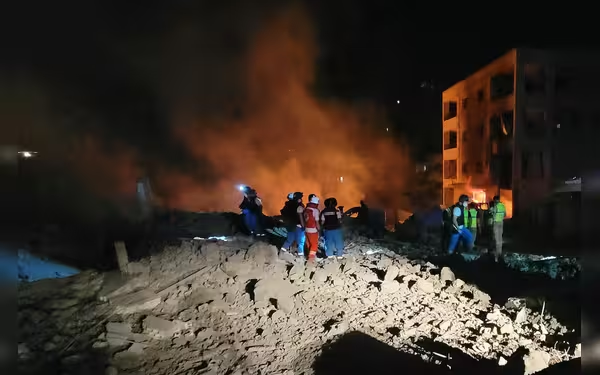Saturday, November 16, 2024 05:52 PM
US Voices Concerns Over Israel's Bombing Campaign in Beirut
- US opposes Israel's extensive bombing in Beirut.
- Civilian casualties in Lebanon exceed 2,350 due to strikes.
- Recent decrease in bombing intensity observed by US.
 Image Credits: arabnewspk
Image Credits: arabnewspkThe US has raised concerns over Israel's bombing campaign in Beirut, citing high civilian casualties and urging a reassessment of military actions.
In recent weeks, the United States has expressed significant concerns regarding Israel's bombing campaign in Beirut, Lebanon. This military action has raised alarms, particularly due to the rising civilian death toll. The U.S. State Department spokesperson, Matthew Miller, made it clear that the United States opposes the extent and nature of the bombings that have been occurring in the region.
Miller stated, "There are specific strikes that it would be appropriate for Israel to carry out. But when it comes to the scope and nature of the bombing campaign that we saw in Beirut for the past few weeks, it’s something that we made clear to the government of Israel we had concerns with and we were opposed to." This statement indicates a shift in the U.S. stance, as it adopts a more critical tone towards Israel's military operations in Lebanon.
Israel has intensified its bombing campaign in Lebanon, targeting areas such as Hezbollah’s strongholds in southern Lebanon, the southern suburbs of Beirut, and the eastern Bekaa region. The situation has been escalating since October of the previous year, coinciding with Israel's military actions in Gaza, which were triggered by an attack from Hamas on October 7.
According to the Lebanese health ministry, Israeli strikes have resulted in the deaths of at least 2,350 individuals over the past year, with more than 1.2 million people displaced within Lebanon. The majority of these casualties have occurred since late September when Israel broadened its military campaign.
Miller noted that there has been a recent decrease in the intensity of Israeli bombings in Beirut, stating, "We’ve seen them come down over the past few days, which is not a prediction about what will happen in the future." This observation suggests that while the situation may be improving, the U.S. will continue to monitor developments closely.
The ongoing conflict in Lebanon highlights the complex dynamics of regional politics and the humanitarian crises that arise from military actions. As the international community watches closely, the hope remains that diplomatic efforts can lead to a resolution that prioritizes the safety and well-being of civilians caught in the crossfire. Understanding the implications of these military actions is crucial, as they not only affect the immediate region but also have far-reaching consequences for global peace and security.













